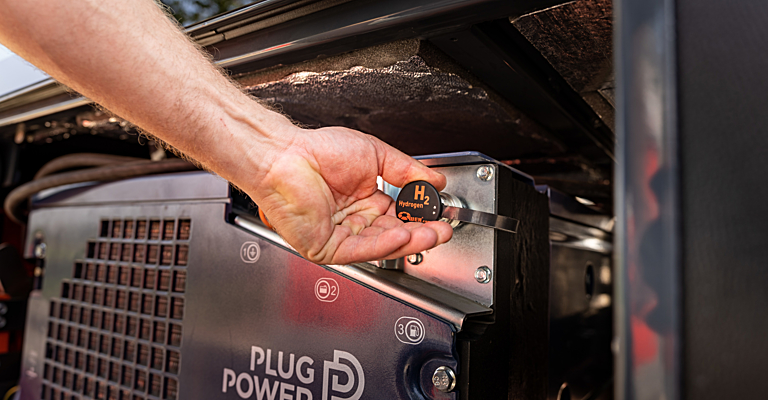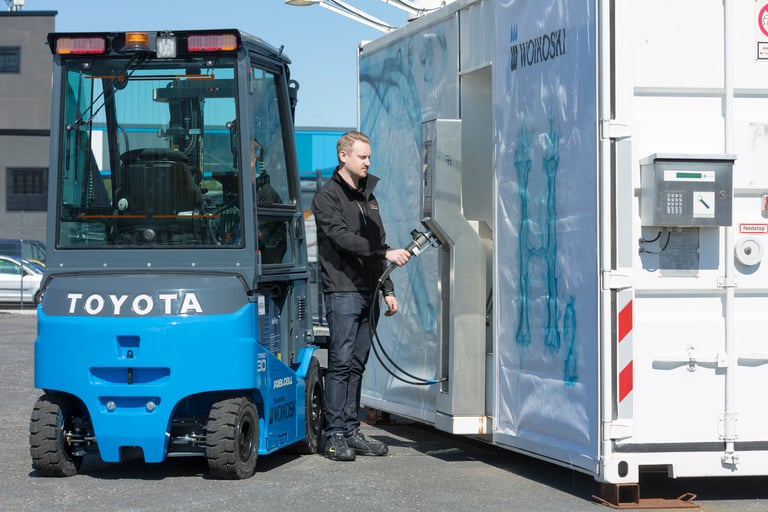Forklifts running on hydrogen by using fuel cell technology are rising fast. Hydrogen is a clean, productive, efficient and CO2-neutral (if green hydrogen is used) energy solution that is very interesting for multi-shift and heavy-duty operations. Since it’s not a standardised procedure like with lead-acid batteries, the process of implementation will always be custom-made and viewed from an energy strategic point of view. Fuel cell technology requires a new way of thinking, about processes and energy. This blog is a must-read if you’re considering hydrogen as an energy carrier. Since fuel cell is only at the beginning of its innovation cycle, it’s the perfect moment for early adopters and innovation leaders to make the switch. A hydrogen project has great potential but there are definitely a few things to consider before contacting change management.
Note that local rules and regulations apply. Every country or even every region may have different legislation or guidelines concerning hydrogen fuel cells. Always make sure to check these first.
Have you googled the operational advantages of hydrogen fuel cell?
Is there room for improvement in time, space, and capital? How big is your need for more flexibility? Is there room for logistic process improvements? Want to replace diesel or LPG with electricity? Are you looking to reduce your CO2?
We’re quite sure that you have probably already done a deep dive into the benefits of hydrogen fuel cell. Fuel cell is flexible and therefore easier and more efficient to handle peaks than lead-acid and Li-ion batteries. No need for extra batteries as you can refuel your truck completely in only two to three minutes. 0,5-1 kg of hydrogen in the tank is good for eight hours of operation.

Have you mapped out the daily specifics of your operation?
What’s your fleet size? How many shifts of how many hours do you have? What is your current energy source? How trained and disciplined are your drivers?
The bigger your fleet and the more intense your operations, the faster you will reach your return on investment. Fuel cell can really be a big asset to certain types of operations:
- Operations with counterbalanced forklifts that lift 1.5 to 5 tonnes and need a lot of energy.
- Operations that are experiencing difficulties at electric charging stations.
- Mass logistics service providers where everything revolves around productivity.
Fuel cell comes highly recommended if you want to make your material handling more sustainable, productive and efficient. It also makes recharging faster, easier and retains its maximum power throughout its battery life.
Fuel cell is an easy-to-manage type of energy source. It will save your employees some time since hydrogen-fuelled trucks require less maintenance and are easier to fuel, which will take your employees just a few minutes. So, you will see a clear increase in profit when you replace your old lead-acid batteries that have been damaged due to poor battery management or carelessness with easy-going hydrogen fuel cells.
Does it fit your company culture?
Are you an innovative company? Do you like to invest in new things and keep improving? Do you like to cooperate with other companies? What are your eco-footprint and sustainability goals? Are you especially interested in renewable energy?
Since hydrogen is a newcomer in the field of environmentally friendly fuel sources, it’s an investment to make for the future. It’s important that this investment fits your company culture and image.
Does it fit your company characteristic?
Do you supply your own green energy (solar, wind, etc.)? Is your business already linked to hydrogen in any way? Are you building a new operation or changing a current one? Are you experienced in taking on big investment projects? What are your company hygiene needs?
It’s easier to implement hydrogen when building a new operation because you can take the layout requirements directly into account and adapt your facilities accordingly. Of course, with some extra investments, you can make fuel cell-related changes to your existing operation if preferred. Please, do keep in mind that while switching to hydrogen fuel cell is a big investment, an increasing amount of countries are joining the cause and are locally subsidising the investment costs for fuel cell.
Presently, the airport and maritime transport industry are dealing with a lot of pressure to reduce their ecological footprint, making hydrogen a good fit as it does not have any emissions if green hydrogen is used. Hydrogen is also exceptionally clean and quiet, a must in some operations. Hydrogen can be extracted from a wide range of substances (including water) and is considered abundant on our planet. When using hydrogen in a fuel cell engine, the only emissions will be heat and water.

Is it feasible to have a hydrogen station at your operation?
When looking at feasibility, the first question to ask yourself is: how likely are you to receive a permit? Terms and conditions for granting permission to install hydrogen stations differ depending on country or region. For example, in the Netherlands; the closer your operation is to a ‘residential’ or ‘green’ area, the less likely you are to receive a permit. And of course, without a permit: no hydrogen station.
A second issue you will have to check is whether you can realise the fuelling conditions and guidelines set within your country or region. Some arrangements will have to be made to make sure your hydrogen-powered truck can refuel safely. Again, these conditions are country and region-bound; for example, in many European countries, this involves having a 20-metre perimeter around the hydrogen fuelling station. Putting your hydrogen station close to your building will thus result in some legal issues. So please, always check your local guidelines before investing in hydrogen energy. When refuelling outside you can, however, put a wall around the fuelling station to reduce the perimeter. If you opt to refuel inside you need to add gas pipes into your building.
Of course, the feasibility of your fuel cell project also depends on the availability of hydrogen. Is there lots of hydrogen available in your country? Then hydrogen fuel cell might be the thing for you; otherwise, you might have a hard time getting a sufficient supply to support your fleet.
Ready for the next step?
Our energy experts will gladly help you through the process. So, don’t hesitate to contact us if you’re considering switching to fuel cell or if you have any questions concerning the topic. Our energy experts will set up a meeting to give you more information and to take a detailed look at your organisation. After that, they will create a business case based on your specific needs, layout, goals, operational methods, etc. Local processes may differ as well as local legislation, regulation, and subsidies.
Fuel cell is an investment for the future. Today, you can position your company as a modern, environmentally-friendly flagship and a sustainable innovation leader. Just remember that hydrogen is not only a green type of fuel you can use in your material handling equipment but also an energy carrier that powers your entire logistics chain from lorries to vans and even taxis as a fuel cell.

.jpg)



